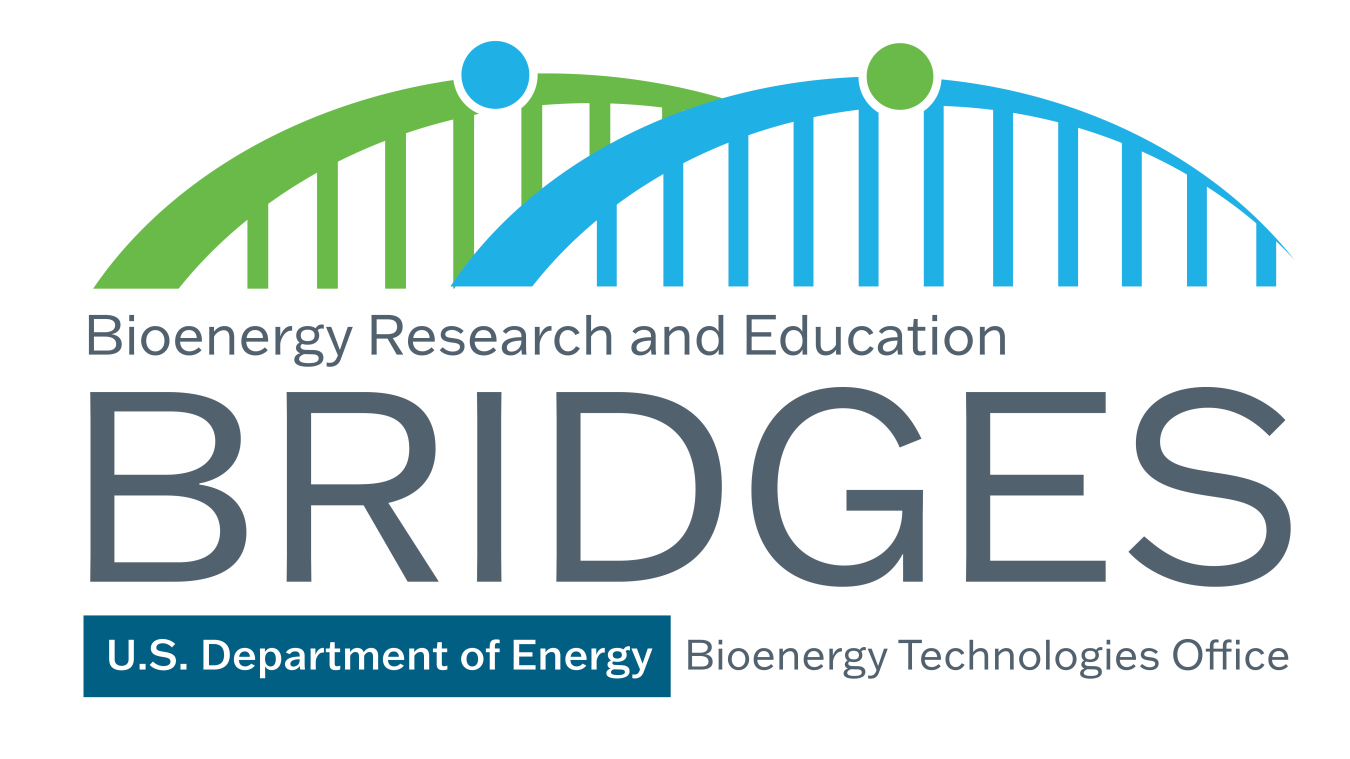
Bridging today’s problem solvers to tomorrow’s energy future
Register for upcoming BRIDGES events and office hours today!
>>>The BRIDGES Primer, Factsheets, and Portal are also available in Spanish!
Quick Resources
**Updated BRIDGES fact sheets coming soon!
- BRIDGES Primer
- BRIDGES Overview Fact Sheet
- Farm to Flight Fact Sheet
- Upcycling Fact Sheet
- Regional Feedstocks Fact Sheet
- Municipal Solid Waste Fact Sheet
- View BRIDGES Webinar Recordings and Presentations
- View the BRIDGES Overview Video
The Bioenergy Research and Education Bridge Program (BRIDGES) is bioenergy case study-based educational toolkit created by the U.S. Department of Energy (DOE) Bioenergy Technologies Office (BETO) in partnership with Argonne National Laboratory (ANL) and Idaho National Laboratory (INL) as well as education, community, industry, and other government partners.
Intended to be taught in various settings from high school to technical and community colleges to universities courses, the classroom case study materials within the BRIDGES Program are designed to encourage future careers in bioenergy for all students. Depending on the student level, each case study toolkit should take at least 3 classroom hours to complete.
BETO and its partners have developed four sets of student and instructor guides, each focused on topical, authentic case study scenarios in the bioenergy field. Each case study explores solutions for a more secure energy future using bioenergy technologies.
- Farm to Flight: Can Sustainable Aviation Fuels Reduce Emissions? Explore the life cycle analysis of biofuels emissions compared to petroleum fuels.
- Upcycling: Could Discoveries in Chemistry Reduce Plastic Waste? Investigate how chemists find new ways to upcycle plastic that returns value to the economy.
- Regional Feedstocks: Can They Contribute to Energy Security? Evaluate regional biomass and waste resources for conversion to transportation biofuels.
- Municipal Solid Waste-to-Energy: Can this Waste Resource Contribute to Economic Resilience? Explore the challenges of transforming municipal solid waste into biofuel and other products.

Materials and Structure
Each case study is comprised of three standard documents, including a student guide, an instructor guide, and an overview fact sheet. Additionally, depending on the case study, students and educators will have access to primary research such as literature and raw data, as well as links to credible online resources for background research including YouTube videos, journal articles, and other scientific reference materials. Each guide is designed to first provide a foundational background and then build on its provided learning materials, leading students towards critical thinking and decision making surrounding the case explored.
Each instructor guide reflects the flow and information from the corresponding student guide while also providing tips for quick start learning, a checklist for any prerequisite knowledge, grading rubrics, additional student research ideas, answer keys, and additional instructions.
Access the BRIDGES Portal to download all BRIDGES materials needed for instructors.
Sign up to receive Bioenergy Technologies Office news, events, and funding opportunities.
Workforce Development Integration
To support workforce development, the BRIDGES Program case studies are designed for seamless use in various classroom settings, from virtual to in-person to hybrid learning, and can be used in any science or non-science courses and majors at the high school, technical/community college, or university level. Learning goals were developed with the consultation of industry experts and scientific leaders in the field with career preparation in mind. Each case study also includes activities to support career exploration in STEM and STEM-adjacent career pathways.
BRIDGES aims to provide adequate background and foundational materials for students and instructors with no prior bioenergy knowledge.
The BRIDGES Program integrates feedback on content, design, and piloting from education, industry and government partners through the BETO BRIDGES National Review Board.
Partners
While the BRIDGES Program is produced and funded by BETO and its lab partners, ANL and INL, it would not be possible without support from the BRIDGES National Review Board, which includes education and community partners that supported case study design, appropriateness, and classroom piloting; as well as industry and government partners that developed scenarios and reviewed materials for authenticity.
Education and Community Partners:
- Allegheny College
- Battelle Education
- College of Eastern Idaho
- Haskell Indian Nations University
- Learning Blade
- Moraine Valley Community College
- Northeastern Illinois University
- Shoshone-Bannock Tribes
- Tennessee STEM Innovation Network
- Waubonsee Community College
Industry and Government Partners:
- BGS
- Chevron-Phillips Chemical
- Ecostrat
- GTI
- United Airlines
- EERE DOE
For more information or with questions, email Bioenergy_BRIDGES@ee.doe.gov.


Related Career and Education Resources


